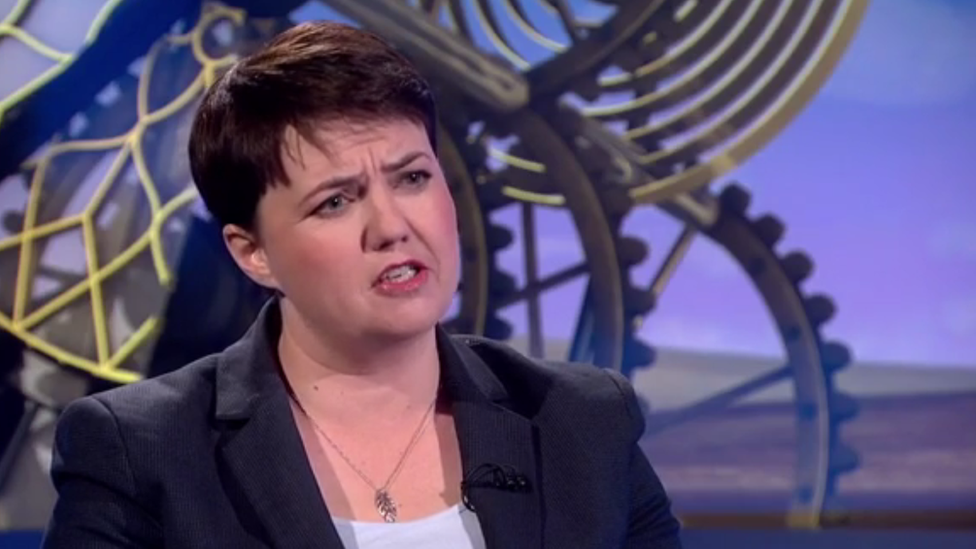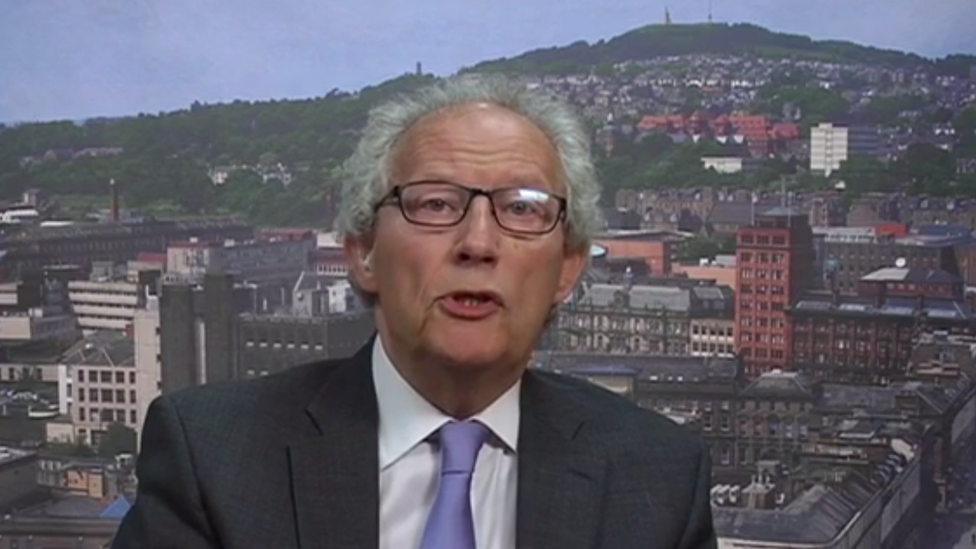Ruth Davidson: Independence questions 'utterly different'
- Published

Scottish Conservative leader Ruth Davidson said talk of a second referendum was "destabilising"
A possible second Scottish independence referendum should not be blocked by the UK government, Scottish Conservative leader Ruth Davidson has said.
But Ms Davidson stressed that questions over trading markets, currency and borders were now "utterly different" and economic impacts could be enormous.
The Scottish government has said the UK vote to leave the EU, not backed in Scotland, makes a referendum possible.
The first minister has been lobbying for Scotland's place in Europe.
Nicola Sturgeon held a series of meetings with senior EU officials last week.
Ms Sturgeon has said she will explore all possible options - but has raised the prospect of a second independence referendum if it emerged as the only or best way to protect Scotland's place in the EU.
Any proposal to hold a new referendum would then require consent from Westminster.
Markets and currency
Speaking to BBC Scotland's Sunday Politics Scotland programme, Ruth Davidson said talk of a second referendum was "destabilising" in the wake of the Brexit vote.
The Conservative leader said "constitutionally" there would be no reason to block a vote, but talk of it was premature and her opposition remained.
Ms Davidson said: "I would argue as strong as I could that we should stay part of our biggest market and closest friend.
"Constitutionally the UK government shouldn't block it, no."
But the Conservative leader said the issues raised by a second vote in light of the EU referendum had "utterly" changed.
"Do you want to leave your biggest market or do you want to leave your second biggest market?
"Do you want to change your currency? Do you want a hard border with your closest neighbour? It would be an utterly, utterly different one [referendum].
"But I'll tell you what will be different - and I've fought two referendum campaigns now where I've had all the Project Fear stuff thrown at me - nobody now will believe that you can have huge constitutional change without an enormous economic impact coming from that."
'On the table'
A spokesman for the first minister described Ms Davidson's position on a referendum as a concession.
He added: "Nevertheless our focus as a government is on the negotiations that lie ahead, to protect Scotland's relationship with the European Union and our place in the single market.
"Scotland needs the stability and security of remaining in the world's biggest single market - for jobs, investment and prosperity.
"As we have said a second independence referendum is an option which requires to be on the table and to ensure that option is a deliverable one in the required timetable steps are being taken now to ensure that the necessary legislation is in place."

Henry McLeish has sometimes been said to be close to backing independence
Meanwhile, former Labour first minister Henry McLeish has said he could back independence, but that Scotland is "not ready".
Mr McLeish told Sunday Politics Scotland "I've said the European issue has strengthened, positively, the case of independence and that I could vote for independence.
"I was devastated last week when we took that catastrophic decision to leave the EU, I think that was a tipping point."
He added: "But let me also put a shot across the bows of the SNP - we are not ready for independence, even if that was a reality.
"We have nation-building to do, we've got questions over the currency and fiscal deficit and what Brexit has shown us is that when you have a minority voting for one thing you create bitterness."
A Scottish Labour spokesman said: "Kezia Dugdale has given her support to the First Minister to negotiate with the EU institutions in order to find a solution that respects the will of people in Scotland to remain inside the European Union.
"However, Scottish Labour does not support a second independence referendum and it is clear that attempting to remove Scotland from a union with its biggest trading partner - the rest of the UK - and with no certainty over what currency we would be using would present a significant risk to Scottish jobs and to our economy."